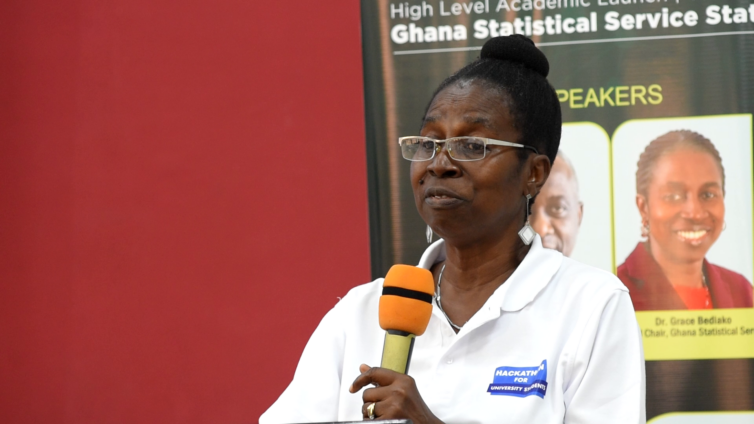
Audio By Carbonatix
The Ghana Statistical Service (GSS) has made known its intention to contribute to building a data-literate country that would have its policies driven by data.
The Board Chair of the GSS, Dr. Grace Bediako, who made this known said her institution launched four digital platforms towards achieving this feat, by enabling easy access to their database, which has millions of indicators, collated from across the country.
She said the StatsBank, Digital Census Altla, Rasterized Data, and Microdata Access platforms, were designed to provide up-to-speed census indicators to researchers, policymakers, and the general public, with a user-friendly interface.
“And I think fundamentally, we want to have a data-driven country and data-driven policy environment so the government can enact policies based on sound information, and analyzed data”, she said while speaking at the University of Health and Allied Sciences (UHAS) edition of the GSS StatsBank.
“For years, we produced a lot of data, a lot. Even though when people are discussing and talking about the availability of data, we tend to say there isn't enough data, we don't have data on this, and especially my friend the gender people, they say there is no data on gender. But there is a lot of data. I think what we have failed to do is to make the data available and accessible”, she added.
She explained that StatsBank, one of the GSS platforms is an online data archive, which has disaggregated data from censuses and surveys, with over 350 million statistics. It is designed not only to be used by technocrats but people with basic knowledge.
On Digital Census Atlas, Dr. Bediako explained that the platform furnishes users with a visual census outlook on the Ghana Map, providing data on geographical locations in percentages instead of absolute numbers. It has over 350,000 indicators.
She elaborated that the distinctive feature of the Rasterized Data was how it serves users with data beyond the national, regional, and district levels, adding that it extends to the remotest and smallest areas in the country.
She said the Microdata access platform has been fed with raw data for specialized analysis and was designed for advanced users such as academia, and researchers, among others.
She further indicated that her outfit is aiming to partner with universities, government, and private institutions to process and make data collected by these institutions available on their platforms.
“For GSS to also exercise its role as the coordinator of statistics, and also the institution that validates the official data of any type of information, statistical data, then we are trying to get Universities like yourself, MMDAs, Ministries, Departments, and Agencies that collect data, governed by some microdata determination policy as well as MOUs between GSS and these institutions so that we can collectively make this data available. So the money that we have already invested will be well utilized”, she added.
Dr. Bediako said it now behooves on policymakers, academia, and researchers “to engage with the data” to ensure its effective use.
The Registrar of UHAS, Ms. Yaa Amankwaa Opuni, lauded the initiative by the Ghana Statistical Service and underscored its vital use by the academia.
“This initiative, bringing information to the doorstep of stakeholders, and institutions such as UHAS by the GSS is very laudable. We can agree, not only have they shown us credible information available to us, but they have shown, demonstrated to us how we can actually access the information on their platforms”, she said.
Team Yellow which developed the “Urbanization, Population Density, and Water and Sanitation; Challenges to Sustainable Development in Ghana" emerged winners of the UHAS Hackathon edition.
The team used data made available by the GSS platforms to analyze the relationship between population and sanitation, employment and population density, and population density and sanitation.
Team Yellow will represent UHAS to contest the University of Ghana, the University of Cape Coast, the University of Development Studies, and the Kwame Nkrumah University of Science and Technology for the ultimate price.
The GSS Hackathon is being organized to highlight how tertiary institutions would use data provided by the GSS platforms to develop ideas to aid in tracking the country’s progress toward achieving the Sustainable Development Goals.
Latest Stories
-
Tell the story properly – Yaw Nsarkoh calls for identity, solidarity over guilt
59 minutes -
Don’t turn reparations into escapism – Yaw Nsarkoh warns Africa
1 hour -
Show us route to the cool cash – Yaw Nsarkoh challenges reparations optimism
2 hours -
Two dead after winter storm hammers the US northeast
2 hours -
GRA interdicts 5 Customs Officers over transit cargo irregularities
2 hours -
Democracy without development? – Yaw Nsarkoh says Ghana got it wrong
3 hours -
[Photos] Mahama swears in new Fire and Immigration chiefs
4 hours -
Agona Swedru Police Command arrest two in possession of suspected narcotics
5 hours -
Trump to address a changed America at vital moment for his presidency
5 hours -
Prudential Bank, Mastercard discuss support for SMEs and corporates
5 hours -
Mahama appoints Aaron Kanor as Acting GRA Commissioner for Customs Division
5 hours -
Threat of further violence looms after Mexican cartel rampage
5 hours -
Abesim murder case: Footballer sentenced to life imprisonment
6 hours -
Third force not the answer – Yaw Nsarkoh questions Ghana’s political fix
6 hours -
Prudential Bank champions tree crop investment at TCDA anniversary dialogue
6 hours

